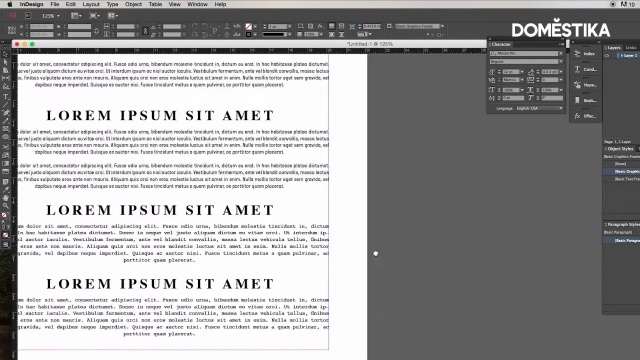Typography Tutorial: Tips for Choosing the Perfect Font

Discover the keys to choosing the most suitable typography for your editorial project with Violeta Hernández
Choosing the ideal typography for a project is, for many, the most complicated aspect of editorial design. There is no one perfect typography that can do everything, or universal rules that limit the options available to us, which can make our work very complicated.
That's why Violeta Hernández (@soyvioleta), graphic designer, artist, and illustrator, has given us a series of tips to help make this important decision and choose a typography that fits and contributes to our projects. Learn these keys in the following tutorial:
6 tips for choosing the perfect font for your publishing project
1. Simplicity above all
Although sometimes we may think that our choice of typography should be far-reaching and shocking, the best option in editorial projects is always to start with the basics. Classic fonts such as Caslon, Times New Roman or Courier are always good options, not only because they are easily legible, but also because they can be modified extensively (italics, bold, light, etc.), giving us visual flexibility when composing our texts.
This does not mean that we have to limit ourselves: even if we have chosen a classic main font, we can always combine it with other more contemporary or original ones if we feel it is necessary.

2. Consider the size of your text
When choosing a typeface, we should take into account the size of the different parts of the text we are working on, since a typeface that we like at a certain size may not be suitable, for example, for a headline.
However, we should limit the use of different sizes as much as possible, to maintain an easily distinguishable hierarchy.

3. Aesthetics versus readability
It should be remembered that in editorial design, aesthetics should not take precedence over legibility. Our text should be easy and clear to read, so before choosing typographies with aesthetic alterations that may make reading difficult, it is better to opt for a clearer alternative.
Another important aspect to take into account is the type of reader to whom the text we are preparing is addressed. The level of clarity and readability we will need to reach will not be the same for a text aimed at young people as for one aimed at older people.
4. The font isn't everything
Although typography is a vital part of editorial design, there are other elements we can control apart from the font we are using: the spacing or size, as well as the space between the letters. Thanks to these elements, we can play with our typographies without having to change them for others, increase their legibility, and change their aesthetics.

5. And for the cover?
In the case of a magazine or fanzine cover, we can afford to mix more fonts, up to three or four. We can also use more ornamental styles since–due to their size, they will not be difficult to read.

6. Always print before exporting
The last step to choosing the best typography is always to print the texts before finishing the project. On paper, it will be easier to detect deficiencies or possible improvements to be implemented.
Although there is no mathematical formula for choosing the best typography, these tips will guide your search and help you avoid basic errors in your editorial projects.
If you liked this tutorial, you can learn the basic techniques of editorial design as you illustrate your own story with Violeta on her online course Design and Illustration of a Fanzine.
You may be interested in:
- How to Choose Fonts, a course by Enric Jardí
- Introduction to Adobe InDesign, by Javier Alcaraz
- Adobe Illustrator for Typography, Lettering and Calligraphy, by Andrés Ochoa






0 comments